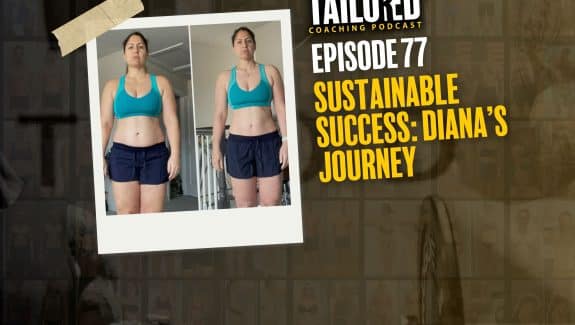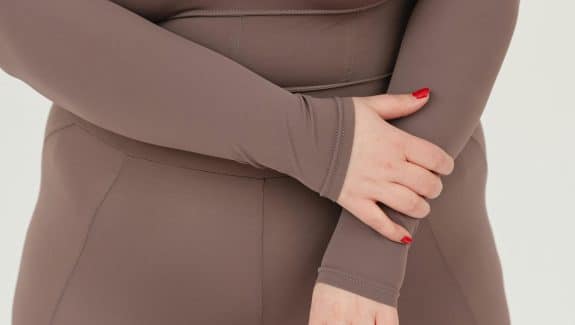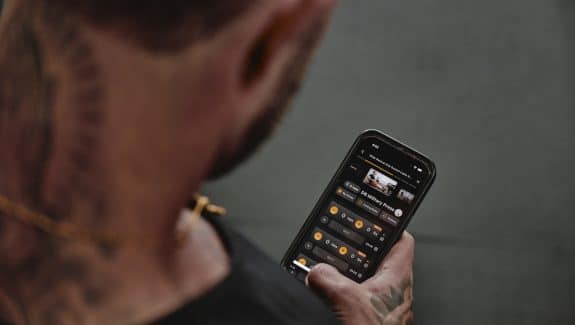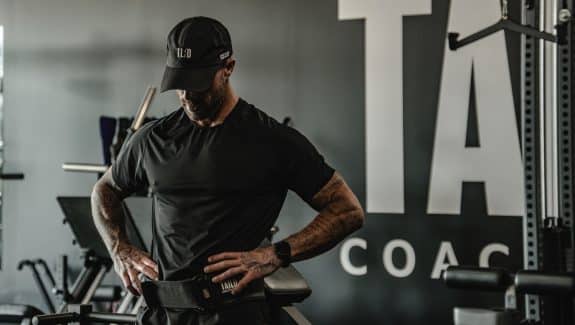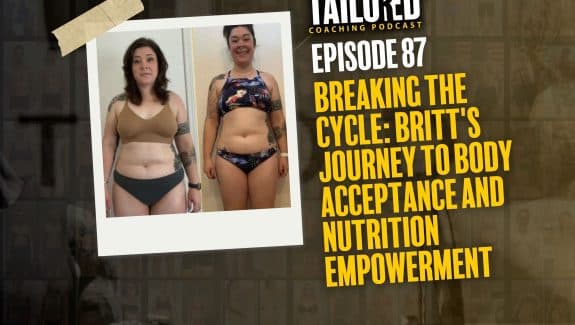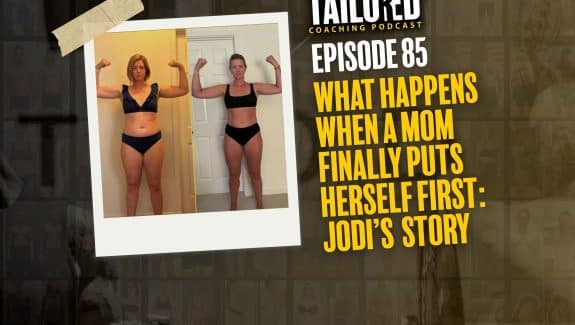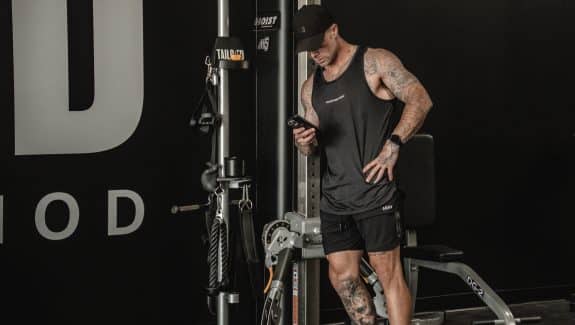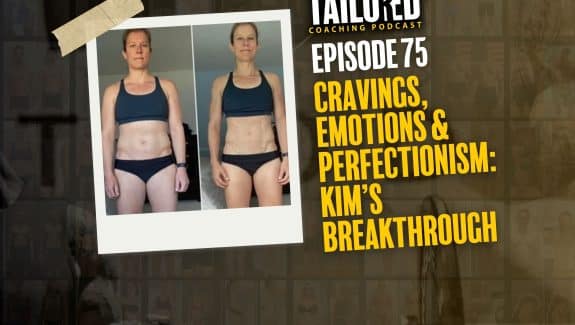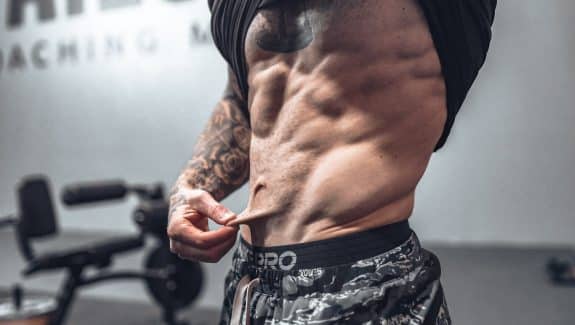 # 1 – I’m Ready To Get Fit! But Where Do I Start…?
# 1 – I’m Ready To Get Fit! But Where Do I Start…?
Most people are ready for a change and the first thing they think they “Should” do is remove a ton of bad things and count calories…
The harsh reality is that this is very unsuccessful. It may work for a small portion of time but by the end of the week, or if you’re really diligent and stubborn with it maybe the month, it’s bound to fall apart.
Even though it may seem as taking a huge step forward while your motivation is sky-high at the beginning of your journey would be smart, it’s actually better to take a much smaller step.
See, when we take baby steps in the nutrition game it will take us much further ahead in the long run. The reason is simple – we love success. If we can make successful, small steps, over and over again then it will create a domino effect week after week and we can keep adding in small steps towards better nutrition.
If we take one huge step right away and fail, we get emotionally and mentally down on ourselves and that will only lead to more negative steps and drive us even further away from our goals.
As hard as it is to be patient and understand that getting lean and staying lean is a long process, taking the slower route will show much longer success and you will be able to keep that success for life.
So when I take our Vigor Ground clients through their first steps in nutrition I take them through simple habits and add a new habit every 1-3 weeks, depending on their ability to stick to the habit given and also their confidence on a scale of 1-10 on accomplishing the next habit as well.
Examples of those first steps would be drinking more water, getting more protein and veggies into each meal, and substituting in some healthier fat sources like avocados, fish or coconut oil.
The reason for this is simple, this will ensure their body’s get better and more valuable nutrients and will lead to better function and performance.
After that is accomplished we can then move towards eliminating processed foods and implementing more whole food sources.
# 2 – Should I Stay Away From Carbs?? Carbs Just Cause Fat Gain… Right?!
I can’t even count how many times I’ve asked a client what they believe would help them lose more weight or burn more fat and the answer was to cut carbs.
And I don’t blame them! I used to believe it and with as much low-carb shit that is all over the media, they have the right to believe it!
But the truth is that carbs are not our enemy, in fact a lot of people would achieve a better body composition if they decided to eat some more carbs from the right sources.
The main issue is that the American diet is filled with processed carbs, like white breads and junk foods with loads of sugar in them.
Now if you cut these types of carbs out, yes that is a great way to lose more weight! It drops calories a lot and gets the bad crap out of your body, allowing better functioning all around.
So what I suggest is not cutting the carbs, but switching the types of carbs you’re eating to whole food choices like fruits, vegetables, root veggies, and whole grain foods like oats or rice.
This doesn’t mean go hog-wild on all the sweet potatoes you can get your hands on, but sticking to about a handful sized portion at a time, around your workouts.
For more detailed info on this, check out my infographic on how to meal prep using this system -> HERE.
# 3 – Is Gluten Bad For Me? Should I Avoid All Grains?
This one is a very popular one, with all the paleo and whole 30 camps that have been started and growing lately.
The answer and solution are extremely simple.
The answer – No. Gluten is not bad for you and you do not need to avoid grains.
UNLESS, you have celiac disease or FODMAP intolerance and if you do suffer from one of these, you would know.
So the solution is to simply remove the grains and/or gluten containing products from your diet for a week or so.
Do you feel better without them? Feel the same? Or maybe you miss having some whole grain oats and Ezekiel bread after your workouts and because of that, you have less motivation to workout…?
All’s you need to understand is your own body and if it is ok with processing and digesting the nutrient.
Most grains have a lot of benefits from the vitamins and minerals to the great source of fiber they provide. So before you rule them out, test it out and then determine if it is right for you.
But do not fear them, in fact I will give you a great example to show you that it is extremely individualized.
I personally ate Ezekiel bread, oats and rice as my main carb sources leading to my physique show where I got my leanest ever. A client of mine Angela Pham eats rice, oats, bread, and other grains if she feels like it and she is 3 weeks out from a show and honestly looks great enough to hop on stage right now! (Shout out to Angela 😉 Good job!)
And to be the devils advocate of that, I have some clients that we simply cut out breads and grains and they had better digestion and weight loss because of it.
It’s individualized 100% of the time. For more on how YOU can find out for yourself, check out my article breaking it down -> HERE.
Or for more detailed info on grains specifically, check out Precision Nutrition’s article -> HERE.
# 4 – What Is The Best Diet To Lose Fat?
The answer to this question all depends on the type of coach you ask…
But a good coach has no answer. Because there simply isn’t a “Best Diet”.
A great diet for a client to successfully lose weight would be a diet with a slight calorie deficit so they can maintain a healthy rate of weight loss on a regular basis, it would be well-balanced when it comes to the macronutrients Protein/Fat/Carbs, it would have an abundance of nutrient dense whole foods 90% of the time, and it would fit that person’s lifestyle and schedule well enough to not cause any unnecessary stress.
Oh, and most importantly, it would be sustainable in the long run!
Many people start a “Diet Plan” and I ask them, “Do you see yourself being able to stick with this for the next year or longer?”
Most of the time the answer is, “HELL NO!”
So my response is simple, “What is the point? And what will you do after?”
That’s why when I coach clients we focus on an “Eating Plan” that they believe in and they’re confident that they can stick to in the long run AND that will produce better performance and results.
Might not be the answer you were hoping for, but it is the truth and hopefully will lean you towards the right idea of a successful nutrition plan.
If you need more help on figuring out what it is that YOU should be doing on a regular basis for nutrition or if you need more accountability to stick to what it is you’re doing, apply for a Strategy Session with me and lets figure it out -> HERE.
# 5 – Do I Need To Count Calories?
This may be one of the more difficult questions to answer, because as many of us know the equation for fat or weight loss is to burn more calories and eat fewer calories, A.K.A. daily calorie deficit.
But there is also the issue that many food labels can be up to 25% off, which makes a lot of our calorie counting incorrect.
But at the same time, counting calories can give us awareness of how much we’re actually eating and will also provide accountability…
So what is it, yes or no to counting calories?
The answer is yes and no, because it ultimately depends on the person and what stage they’re at.
As I stated before, at the beginning stages it is very unnecessary because focusing on whole nutrition, building habits, training a bit harder, and eventually eliminating processed foods while all lead to a calorie deficit. So you essentially accomplish the fat loss equation without the calorie counting.
Eventually if you’ve accomplished all the habits, are feeling very confident and have had great success with good nutrition on a regular basis, then you can consider counting calorie to speed up or break a fat loss plateau.
Even if the calories in the label are not 100%, it still gives us a great estimate of what we’re taking in, so it is something to consider.
But if the question is “Do I NEED to count calories?” – then my answer is no.
A great way to become successful and determine what stage of good nutrition you are in would be to check out the following infographics I’ve made for you:
- Phase #1 – 10 Principles For Results Based Nutrition
- Phase #2 – The Handful Diet & Preparing Your Meals For Success
- Phase #3 – The 3 Step System To Calculating Your Calories and Macros
# 6 – Should I Do A Juice or Detox Cleanse Diet?
The issue I have with these is that it can cause extremism within our fitness and nutrition lifestyle. It also isn’t a “Lifestyle” approach and the way I personally coach, along with the entire Vigor Ground Fitness Team, is to have a long-term outlook on the success and health of a client.
If the client feels the need to utilize a cleanse for a short period of time because of gut, health, or digestive issues, I will undoubtedly support them through it and will guide them into a good nutrition path when it is over.
The key thing for us to remember with cleanses is that they can cause the following:
- Protein Deficiency
- Too Few Calories Daily
- Restrictive Eating or Deprivation (This can lead to binging or emotional eating post cleanse)
- Blood Sugar Swings
My goal isn’t to scare you here, it is to shed light so you can learn how or if they’re right for you at the time you’ve considered them.
Maybe it is protein deficient, but you supplement BCAA’s to help with the risk of muscle loss or strength decreases. The point here is to prepare you and ask your coach for the best possible option.
In my opinion, lifestyle approaches to nutrition that can ensure health, performance, and longevity of the plan are always the best way to go.
If you’d like to learn some more on this topic, check out Precision Nutrition’s article -> HERE.
# 7 – When Should I Eat? Do I NEED Breakfast? Post Workout?!
Many questions come our way about Nutrient Timing, or when should I eat what.
The more studies are being done and published the more we’re realizing that nutrient timing isn’t as serious as we once thought.
For one, if weight loss is a simple equation of creating a calorie deficit at the end of each day then when you have those calories does not really matter.
Secondly, we’re realizing that protein synthesis and glycogen replenishment post workout is extended much further than the “1 Hour Post Workout Window”, so no need to run to your protein shake right away.
I do suggest clients eat after a good workout, specifically a whole food meal containing 1-2 handfuls of protein and carbs. But you have more than enough time to drive home, casually, and cook that meal.
And thirdly, the breakfast dilemma. With all the studies done on intermittent fasting, I believe it’s safe to say that skipping breakfast will not kill you or cause your bicep to fall off either.
If you love breakfast, eat it! If you’re not hungry and would rather wait til lunch to eat, then do that!
It all comes down to your schedule, your lifestyle, and what you feel works best to keep stress the lowest, satisfaction with your food the highest, and sustainability at its best.
The only time I ever consider or worry about nutrient timing is when it comes down to specific performances like getting on stage or timing peak energy levels for athletic sport or performance.
If body composition and generally getting leaner is your goal, nutrient timing doesn’t need to be at the top of your list.

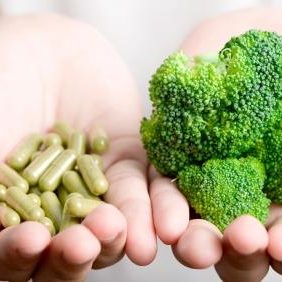
 # 1 – I’m Ready To Get Fit! But Where Do I Start…?
# 1 – I’m Ready To Get Fit! But Where Do I Start…?






























































